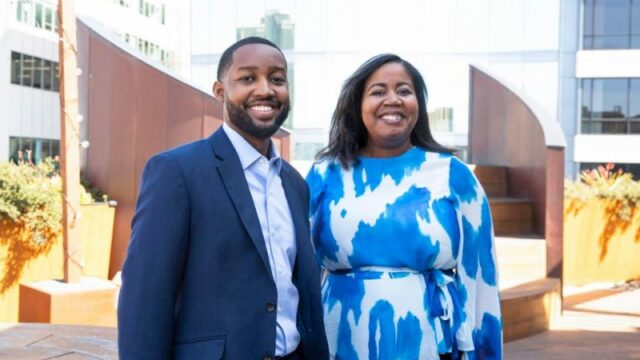Our Theory of Change
The Leaky Tech Pipeline
We’re fixing the technology pipeline from start to end.
The Kapor family of organizations utilizes the Leaky Tech Pipeline Framework to articulate and address the systemic biases and barriers across the entire tech ecosystem, from K-12 and postsecondary education, through the tech workforce, entrepreneurship, and venture capital. We align our research, programs, partnerships, and investments to this framework, aiming to take a comprehensive and holistic approach to interventions and solutions to enhancing equity in technology.
For more details, visit leakytechpipeline.com / The Leaky Tech Pipeline Report
The Issue
We need to set up all future leaders for success
Early racial, gender, and socioeconomic disparities in access to STEM and computer science education in PreK-12th grade limit the opportunities that all children have to engage meaningfully with technology, develop computational skills, and explore careers in computing.
75%
Almost 2x
How We Address The Issues

Expand Equitable Computer Science Education
In PreK-12 public education, policy changes, education reform and financial investments are needed to develop rigorous standards for computing education. This means increasing the availability of computer science courses, providing training and certification pathways for teachers, and ensuring computer science courses are incentivized via graduation requirements and college credits. These changes are needed to ensure that all students have the opportunity to participate in rigorous, engaging, and relevant computing instruction.
It is critical that these educational opportunities provide not just access to introductory courses, but provide opportunities for repeated exposure including computing pathways (E.g., Cybersecurity, Networking, Web Design, etc.) and Advanced Placement computer science courses, in order to prepare students for college and career readiness.

Increase Equity in Education
Significant national, state, and local education reform efforts are needed to improve access to quality preschools, provide school funding for facilities and activities (including technology, science labs, etc.), and provide highly qualified and experienced teachers in all classrooms to ensure all students have the opportunity to develop foundational knowledge, skills, and interest.
Reform is also needed at the high school level to ensure students have equitable access to rigorous coursework, including field trips, career fairs, conferences, mentorship programs, and networking events. Increased diversity among instructors, professors, tech leaders, investors, and board members will also serve to counteract stereotypes and provide aspirational examples for students, early career employees, and entrepreneurs.

Increase Prevalance of Diverse Computing Role Models
To counteract racial and gender stereotypes in computing, exposure to computing professionals from diverse backgrounds can be extremely effective in reducing stereotypes and increasing computing aspirations among underrepresented students from kindergarten through college and the workplace. Exposure can occur in media through movies, TV shows, commercials and social media campaigns, as well as through direct interactions including classroom visits, field trips, career fairs, conferences, mentorship programs, and networking events.
Increased diversity among instructors, professors, tech leaders, investors, and board members will also serve to counteract stereotypes and provide aspirational examples for students, early career employees, and entrepreneurs.
Our Impact
- In 2021, we distributed $2 million to organizations aiming to protect marginalized communities from the harms of technology.
- We distributed over $1 million in funding across over 40 organizations to address a range of critical issues facing communities of color, including civic engagement, COVID pandemic relief, economic mobility, and much more.
- SMASH empowers dedicated students of color with an intensive science, technology, engineering, and math (STEM) education and culturally-relevant coursework to allow them to be successful in college and in their careers.
The Issue
We need to address disparities in the pursuit and completion of computing degrees
In higher education, a variety of barriers affect the preparation, interest, motivation, and persistence of students in computing, resulting in wide gaps by gender and race/ethnicity in Bachelor’s degree completion.
Just 21%
13x Higher
How We Address the Issues

Enhance Pathways into Technology Careers
Pathways into the tech workforce need further development and expansion to reduce barriers to entry for job seekers, expand the pool of technical and non-technical talent, and provide sustainable talent pipelines for tech employers. Workforce development initiatives can include revamping community college curricula and programming to better align with emerging technology needs, bootcamps which provide skill development in specific areas, and apprenticeship and internship programs where young professionals develop skills and social capital by working on discrete projects within companies while gaining access to critical networks.
These programs should be developed in collaboration with industry leaders to ensure that curriculum aligns with the needs of tech companies, while prioritizing the development of talent in local communities to ensure companies reflect the communities in which they are situated. Additionally, in entrepreneurship and venture capital, initiatives are needed to inspire underrepresented entrepreneurs, provide programming for emerging entrepreneurs and companies, and make connections between entrepreneurs from diverse backgrounds and the social networks of power within the technology sector.
Our Impact
In 2021, we engaged over 700 students in CS programming, provided professional development to almost 100 CS teachers, published a new framework on culturally responsive-sustaining CS education, and reached over 4,000 diversity advocates, professionals, and educators with our DEI webinars and trainings.
The Issue
We need to enhance pathways into tech careers
Biases in recruiting, hiring, retention and workplace culture contribute to substantial racial/ethnic and gender disparities in the tech workforce.
Only 10%
Almost 50%
How We Address the Issues

Implement Comprehensive Diversity and Inclusion Strategies
Within higher education institutions, tech companies, and venture capital firms, comprehensive organization-wide diversity and inclusion strategies must be implemented and prioritized in order to create authentically diverse and inclusive workplace environments. These efforts should start with a strong commitment to diversity and inclusion from the highest levels of executive leadership, and include an articulation of core organizational values, specific diversity goals, and consistent data collection and reporting on employee demographics and satisfaction.
A comprehensive strategy for diversity and inclusion must be implemented, which includes all aspects of the company, and not one-off trainings or workshops. Recruitment, interviewing, compensation, performance management, and promotion processes and practices should be audited to examine potential biases, and overhauled as needed to ensure fair and effective processes at each stage in the employment lifecycle. Investment decision-making processes should similarly be examined for bias along with trends in referrals, pitches, and investments. Specific strategies for creating inclusion
must also be implemented, including creating harassment and bias free work environments, supporting employee affinity groups and networks (e.g., ERGs), providing flexibility for parents and caregivers, and supporting work-life balance.
Our Impact
In 2021, we distributed $2M to organizations aiming to protect marginalized communities from the harms of technology.
The Issue
We need to decrease obstacles to tech entrepreneurship for underrepresented communities
Cumulative economic barriers and biases in entrepreneurship pathways affect the opportunities for diverse entrepreneurs to launch products and companies and invest in revenue-generating and social impact ventures.
Nearly 98%
Less than 0.4%
How We Address the Issues

Invest in Early-Stage Startups that Close Gaps of Access for All
The tech entrepreneurship ecosystem in the United States is an intricately related, far more exclusive tier of the broader tech ecosystem, with nearly insurmountable obstacles for large portions of the population. There are even greater obstacles to pursuing tech entrepreneurship for individuals from racial and gender backgrounds underrepresented in tech. We are proud to be pioneers in gap-closing investing, identifying and investing in companies that provide both market and social equity growth. For over a decade we have consistently proved that positive impact does not have to come at the cost of financial returns.
Our Impact
- $126M Kapor Capital launched Fund III, largest fund to date.
- $12M distributed in funding to 40+ organizations to expand racial equity in CS education, promote tech accountability, build tech policy experts, invest in entrepreneurs of color, and support civic engagement and voter mobilization.
- $3.2M in scholarships secured by SMASH alumni.
Explore More…
Press Releases

NBA Foundation to host fourth All-Star Pitch Competition for local small businesses as part of NBA All-Star 2025
Read more
Kapor Foundation Announces New Fellows Focused on Tech Equity Across Education and Workforce
Read more
Kapor Foundation Commits to $1M to Boost Tech and Digital Career Paths in East Oakland
Read more
Report Calls for New Pathways and Policies to Advance Latine Representation in Tech Industry
Read more
Report Spotlights Barriers Faced by Native Communities in the U.S. Tech Ecosystem, Urging Action
Read more
The Kapor Foundation Launches Tech Apprenticeship Equity Toolkit Designed with Opportunity@Work
Read more
Kapor Foundation Launches New Initiative to Advance Racial Justice Technology Policy for Communities of Color
Read more
Kapor Capital Managing Partners Raise Largest Fund to Date: $126 Million to Continue Investing in a More Equitable Tech Sector
Read more
